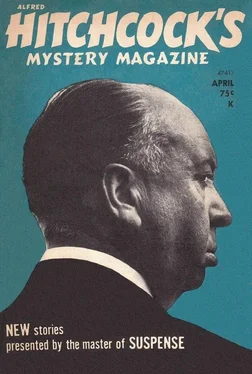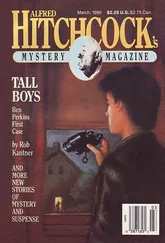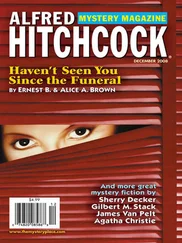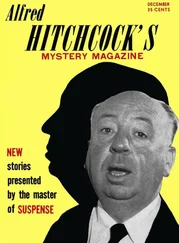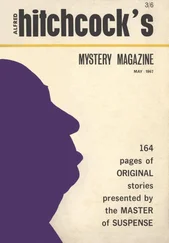Роберт Колби - Alfred Hitchcock’s Mystery Magazine. Vol. 17, No. 4, April 1972
Здесь есть возможность читать онлайн «Роберт Колби - Alfred Hitchcock’s Mystery Magazine. Vol. 17, No. 4, April 1972» весь текст электронной книги совершенно бесплатно (целиком полную версию без сокращений). В некоторых случаях можно слушать аудио, скачать через торрент в формате fb2 и присутствует краткое содержание. Город: Riviera Beach, FL, Год выпуска: 1972, Издательство: H.S.D. Publications, Жанр: Детектив, на английском языке. Описание произведения, (предисловие) а так же отзывы посетителей доступны на портале библиотеки ЛибКат.
- Название:Alfred Hitchcock’s Mystery Magazine. Vol. 17, No. 4, April 1972
- Автор:
- Издательство:H.S.D. Publications
- Жанр:
- Год:1972
- Город:Riviera Beach, FL
- ISBN:нет данных
- Рейтинг книги:5 / 5. Голосов: 1
-
Избранное:Добавить в избранное
- Отзывы:
-
Ваша оценка:
- 100
- 1
- 2
- 3
- 4
- 5
Alfred Hitchcock’s Mystery Magazine. Vol. 17, No. 4, April 1972: краткое содержание, описание и аннотация
Предлагаем к чтению аннотацию, описание, краткое содержание или предисловие (зависит от того, что написал сам автор книги «Alfred Hitchcock’s Mystery Magazine. Vol. 17, No. 4, April 1972»). Если вы не нашли необходимую информацию о книге — напишите в комментариях, мы постараемся отыскать её.
Alfred Hitchcock’s Mystery Magazine. Vol. 17, No. 4, April 1972 — читать онлайн бесплатно полную книгу (весь текст) целиком
Ниже представлен текст книги, разбитый по страницам. Система сохранения места последней прочитанной страницы, позволяет с удобством читать онлайн бесплатно книгу «Alfred Hitchcock’s Mystery Magazine. Vol. 17, No. 4, April 1972», без необходимости каждый раз заново искать на чём Вы остановились. Поставьте закладку, и сможете в любой момент перейти на страницу, на которой закончили чтение.
Интервал:
Закладка:
“I want you to call me back later,” she said firmly. “We’ve got to get this settled between us.”
“I don’t know if I’ll have time—”
“Then make time. If you don’t call me, I’ll call you down there.”
Miles sighed wearily. She knew he couldn’t permit her to call him at the office. The whole town would know about it before supper.
“All right, Gloria, I’ll call you.”
“Before six.” Six was when her husband got home.
“Before six,” he promised.
She hung up without saying good-bye.
Miles put his own receiver down. He could feel stomach acid bubbling inside him like a lava pit. Just last week, old Doc Scott had told him he was on his way to an ulcer if he didn’t settle down a little. That was funny, he thought. He was being picked to lose an election — and his job as sheriff — in two weeks; he had Gloria to contend with; and now an escaped murderer was believed to be heading for his jurisdiction. With all that, he was supposed to settle down a little.
He got up from the desk and went into the private bathroom that adjoined his office. From a package in the medicine cabinet he took some seltzer and dropped it into a tumbler of cold water. While it dissolved, he leaned against the clean, cold tile of the wall. He liked the private bathroom that went with his office. He had drawn it into the plans himself when the county built him a modem new jail three years ago, shortly after he had been elected to his second four-year term as sheriff. Now, from what Billy told him most people around town were saying, the private bathroom and the office would soon belong to someone else.
When the seltzer had fizzed to effervescent water, Miles drank it down and rinsed out the tumbler. He took his gun-belt from a coat rack and went on out to the public section of the sheriff s office. Agnes Hiller, his combination female deputy and office clerk, and Billy Ruud were at the teletype reading the latest highway patrol bulletin.
“What’s the rundown?” Miles asked.
Billy, who had been writing the information in his notebook, read it to him. “Guy’s name is Jacob Dall. Caucasian. Age forty-nine. Five-ten, a hundred and sixty. Gray-black hair cut short, gray eyes, prominent mole on left side of his chin. Last seen wearing green twill prison pants and a white shirt.”
Miles nodded. “What’s his record?”
“Killed his wife eleven years ago when he came home from the office early one afternoon and caught her without any clothes on letting the guy next door out the back way. He tried to get the guy too, but they caught him first. Apparently his mind snapped either before, during, or after the killing, because three court-appointed psychiatrists all certified him insane. The court couldn’t bring him to trial so it committed him under the Insane Criminal Act. He’s been in Sanford for ten years and been a model prisoner.”
“Until eight o’clock this morning,” Miles said. He buckled on the gun-belt he was holding. “Let’s get out on patrol,” he told Billy Ruud. “You take the county line from Miller’s Point east to the main highway. I’ll cruise the west end to River Road and back up to town.” He turned to Agnes Hiller. “Ag, you get on the phone and notify all the farms outside the northern city limits. Use the private line so the public number can stay open. Before you do that, get hold of Clary and Elton and tell them I might need them as special deputies and to stand by. Call us on the radio if anything else comes over the teletype.”
“Got it, Sheriff,” Agnes Hiller said. She was a tall, big-boned woman who had once been a sergeant in the Wacs. Miles had complete confidence in her, as he did in Billy Ruud. It was a shame that they would also be without jobs if he lost the election.
As they walked out of the jail, Miles and Billy ran into the very man who was opposing Miles in the election. He was Able Cross, the town’s chief of police. With him were his two city patrolmen, both of whom were related to him by marriage. A few people paused on the street to watch the confrontation between the two men.
“Afternoon, Frank,” the chief said. “Did you get the bulletin on that escaped murderer?”
“Afternoon, Able. Yes, I got it.”
“What are you going to do about it?”
“I’m going out and patrol the county, Able,” Miles said, “as I presume you’re going out to patrol the city. That’s about the gist of it.”
“I reckon you’re calling in extra men.”
“No, I’m not.”
“I think you should,” Able Cross said, a little too loudly to suit Miles. “The people who live in the county deserve as much protection as the people who live in the city. I’m calling out extra men.”
“You do that,” Miles said evenly. “Put a couple more of your relatives on the city payroll. Before we spend any extra county money, we’re going to find out first if the escapee is even in our jurisdiction.” He jerked his head at his deputy. “Come on, Billy.”
The two of them stepped past Cross and his men and went around to the side of the jail where their cruisers were parked. Before they got into their cars, Miles looked over at Billy and said, “How did he do it anyway?”
Billy frowned. “How did who do what?”
“Dall. How did he kill his wife?”
“Oh. He strangled her.”
Miles nodded and proceeded on into the car. “See you later,” he said. “Keep in contact on the radio; I’ll do the same.”
“Right.”
The sheriff and his deputy drove off in opposite directions.
Miles drove north to the county line road, then turned west. He rode the front seat more erect than usual; his eyes behind wraparound sunglasses were alert and searching. He drove slowly, scanning the fields and farmlands on both sides of the road for any sign of life or movement.
Miles felt good behind the wheel of the cruiser. He liked the big, powerful car. It felt good to step down on the accelerator and feed gas to an interceptor engine with special gears that could fire the vehicle from zero to ninety in twelve seconds. It was comfortable to know that on the roof was a brilliant 600-candlepower red spotlight, and under the hood a shrieking, ear-piercing siren, either of which could instantly increase the heartbeat of any careless Florida-bound tourist failing to observe the county’s speed limits. It was also reassuring to be able to look above the sun visors where a special rack he had designed himself held a riot gun; and feel under the front seat where two spring clamps supported a short-barreled carbine.
Reaching a stretch of road that was cleared and flat on both sides and could be scrutinized with a single, sweeping glance, Miles relaxed and sat back from the wheel. The cruiser, like everything else, he thought, would probably soon belong to Able Cross. The election was in two weeks, and if he lost he would have only two months left in office; two months to get things in order and turn them over to his successor; two months to try to decide what to do, after eight years as sheriff.
He sighed and thought of Gloria. If she had her way about it, he wouldn’t even stay the two months. She wanted him to quit and run away with her before his term of office even expired — to go to Mobile or Atlanta or Charleston and become an insurance salesman or a real estate agent. He grunted softly. He could just see himself lugging a briefcase around all day — no authority, no respect, no nothing.
He came to River Road and turned south, back toward town. The land here, close to the river, was wooded, and he slowed down again and began moving his eyes alertly behind the sunglasses. He cruised for twenty minutes, observing nothing.
When he reached the city limits again, he remembered he had promised to call Gloria back. He made a U-turn and headed down End Street, the last street inside city territory. Half a mile down, he turned into a one-lane drive that led away from the street and dead-ended fifty yards outside the city limits. At the end of the lane was the neat little three-room cottage he rented from the county for next to nothing.
Читать дальшеИнтервал:
Закладка:
Похожие книги на «Alfred Hitchcock’s Mystery Magazine. Vol. 17, No. 4, April 1972»
Представляем Вашему вниманию похожие книги на «Alfred Hitchcock’s Mystery Magazine. Vol. 17, No. 4, April 1972» списком для выбора. Мы отобрали схожую по названию и смыслу литературу в надежде предоставить читателям больше вариантов отыскать новые, интересные, ещё непрочитанные произведения.
Обсуждение, отзывы о книге «Alfred Hitchcock’s Mystery Magazine. Vol. 17, No. 4, April 1972» и просто собственные мнения читателей. Оставьте ваши комментарии, напишите, что Вы думаете о произведении, его смысле или главных героях. Укажите что конкретно понравилось, а что нет, и почему Вы так считаете.
